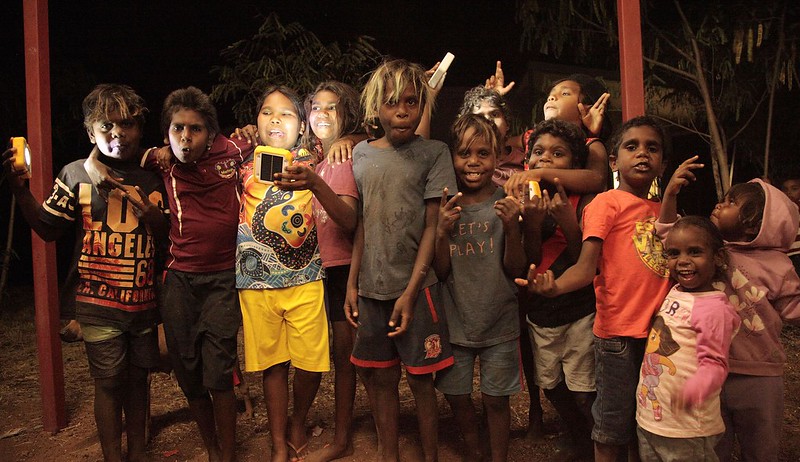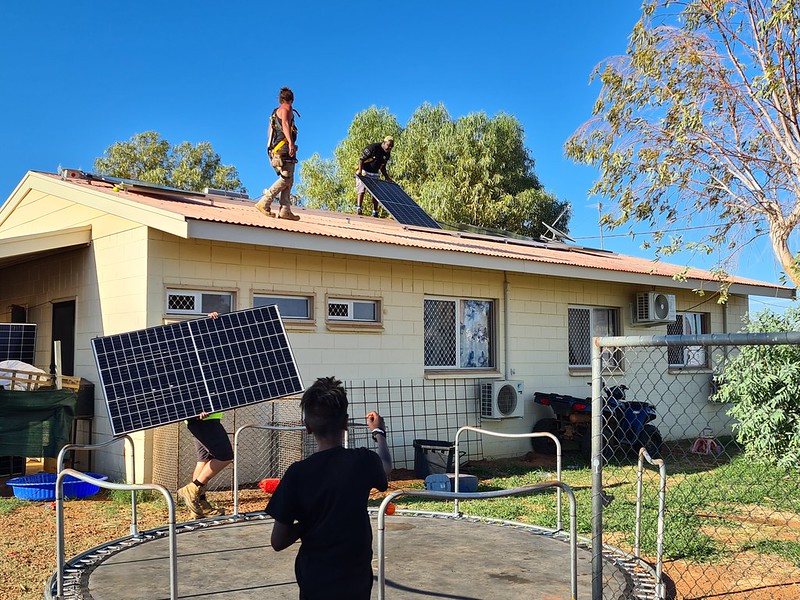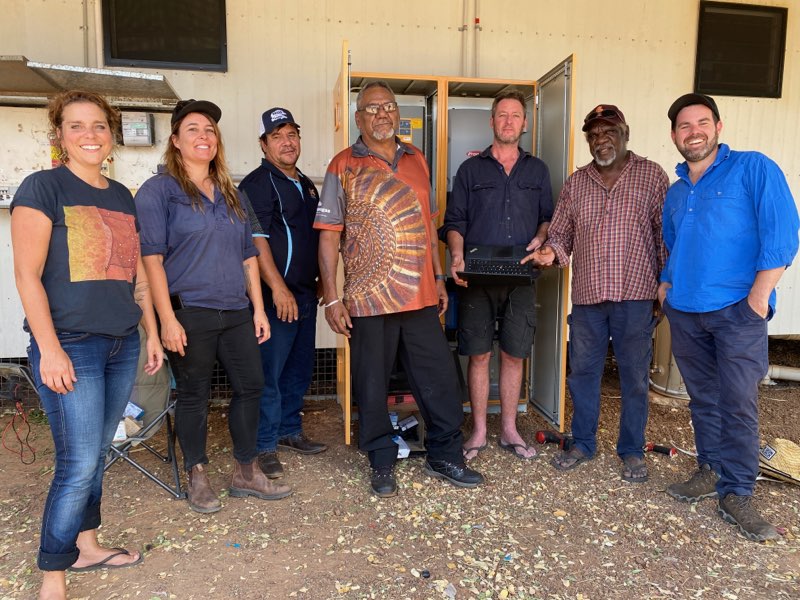We know we need to rapidly transition our energy system away from polluting coal and gas. But how can we do this in a way that recognises First Nations sovereignty, protects cultural heritage and makes sure communities benefit?
The First Nations Clean Energy Network is tackling these challenges with an exciting new model forging better partnerships between community, industry and government. We chatted to Karrina Nolan, Executive Director of Original Power and Founder of the Network, to learn more.
Launched in November 2021, the First Nations Clean Energy Network has a vision for a better, fairer energy system in Australia.
While renewable energy technology is rapidly being rolled out across the country, most First Nations communities are locked out of the benefits. The goal of the Network is to make sure this transition happens in partnership with First Nations – providing communities with cheap, reliable power, secure jobs, steady income and ultimately the power to choose what happens on their Country.

Marlinja kids at the launch of the Marlinja community centre, May 2021. The Marlinja Community Solar Project is a community-led initiative to improve household and community-wide energy security for residents of Marlinja outstation. Phase 1 saw the connection of a solar array on the Community Centre, reducing power bills from an average of $150 per week to just $40 per month.Credit: Original Power
“There is finally a growing understanding across the industry that there’s a crisis in the way our Country and culture is being viewed, and in the way that our lands are utilised when it comes to resource use and extraction,” says Karrina.
“As we transition, regardless of the technology, the majority of large-scale renewable projects will need to access First Nations land and resources for development. So it’s very clear to us that we have significant rights over those projects – and the ability to consent or withhold consent.”
“We know that now more than ever, we must be able to determine what happens on our country. While there’s an urgency to scale up clean energy, it has to be done the right way. With pace, but with justice.”
a better way forward
The idea for the Network came through 18 months’ of roundtables with unions, academics, community organisations and Land Councils. The team also spoke with Indigenous Clean Energy (ICE) Social Enterprise, a Canadian not-for-profit doing similar work in Canada.
First Nations communities have been involved in the development of renewable energy in Canada for nearly 20 years. It has resulted in more than 200 community owned clean energy projects operating across the country, estimated to generate $1.5 billion in Indigenous employment and contracts.
But as Karrina points out, Australia is lagging way behind.
“Our people are just not at the table – and there are no systematic processes, models, incentives, or adequate investment when it comes to renewable energy for and by Aboriginal and Torres Strait Islander peoples.”
This is what the Network aims to change, with three core principles:
- Community
Support communities to drive the development of clean energy projects that provide direct benefits to residents through reduced household energy costs and more reliable energy. - Industry partnerships
Establish an innovation hub, promoting the implementation of best practice principles that should underpin all agreements for land use and benefit sharing between First Nations groups, companies and investors, while building community capacity through training and employment for First Nations people to participate in the renewable energy sector. - Policy reform
Advocate to lift significant federal and state regulatory barriers to renewable energy development and stoke government investment in technology, innovation and infrastructure.
“We think it’s very feasible, both technically and financially, to have renewables on every household – be that in remote communities or in the cities. But there’s a whole range of policy barriers. Part of the work of the Network is to do the policy reform to make that possible.
Showing what’s possible
Karrina’s work with Original Power highlighted the many opportunities that exist in clean energy – but also the huge challenges.
Original Power is an Aboriginal led, not-for-profit community organisation focused on building the power of Aboriginal and Torres Strait Islander communities to self-determine their futures and protect their Country.
“We work with communities in the context of climate change. In particular, where people are challenging new fossil fuel projects and also where our communities are living with some of the highest temperatures nationally and are already feeling the impacts of climate change.”
“For many of our people living on outstations and homelands and in remote communities, the challenge of having a steady affordable supply of energy is great. We know that many are experiencing extreme energy insecurity.”
In Tennant Creek in the Northern Territory, summer temperatures regularly soar above 40 degrees. Power for air conditioning is expensive and most public housing is overcrowded and doesn’t have proper insulation to keep cool.
Rooftop solar should be a simple solution. But a trial project spearheaded by Original Power in partnership with Waramungu man Norman Jupurrula Frank highlighted the structural and regulatory barriers stopping Traditional Owners accessing this clean, cheap, reliable energy.

Installing solar panels on Tennant Creek resident and Warumungu traditional owner Norman Jupurrurla Frank's house in Tennant Creek. Credit: Original Power
Norman’s home is like thousands of community or government-owned homes across the Territory that access electricity via a pre-paid power meter. Residents must purchase power cards and if they run out of credit, the power automatically disconnects until the card is recharged.
Recent research from the Australian National University showed over 90% of households with a pre-paid card meter experienced a disconnection in 2018/2019 – with almost three quarters disconnected more than 10 times.
“So people are regularly without power, it’s unaffordable – often diesel or expensive electricity – and this has huge implications for health and wellbeing. Food goes off, medicines can’t be kept cool and heating and cooling is a serious issue.”
“This can be extremely dangerous, especially as the number of days over 35 degrees in many places in the Northern Territory will increase in 7 years to 137 days. People are telling us they’re cooling just one room over summer for old people to take turns sleeping.”
There were lengthy delays involved in getting Norman’s solar connection approved. But finally in November 2021, Norman became the first prepaid power card customer to integrate rooftop solar, with support from the NT Government utility and retailer.
“The reason why that’s so significant is it has the potential to impact 10,000 other houses. So if we can demonstrate to both the retailers and the government that it can be done, then that just has implications for so many other people.”
WHAT’S NEXT?
While the Network’s pilot projects have been mainly in the Northern Territory and Western Australia, it has plans to involve communities right across the country.
In the lead up to the recent federal election, one of the key asks of the Network was for the incoming government to host a roundtable with all state and territory Energy Ministers to draft up a First Nations Clean Energy Framework, based on the Network’s three core pillars.
“We need to have a specific framework so that we can understand what’s working, what needs to change and where we can put the investment.”
Another key part of this work is developing best practice guidelines for the industry. This means that, regardless of the differences between states and territories, the same key principles can apply to help secure fairer agreements for First Nations communities.
“Our experiences on the ground with communities in the Northern Territory has shown us that everything changes very quickly – and with some work, determination and good relationships policies can be turned around, technology that is rapidly advancing can be deployed and communities really can benefit.”

Karrina Nolan (left) at Marlinja with Lauren Mellor (Original Power), Chris Neade (NLC), Sammy Bush (NLC), Oliver Crowder (Saltwater Solar), Ray Dixon (Marlinja Community), Chansey Paech, former Indigenous Essential Services Minister (NT Government). Credit: Original Power